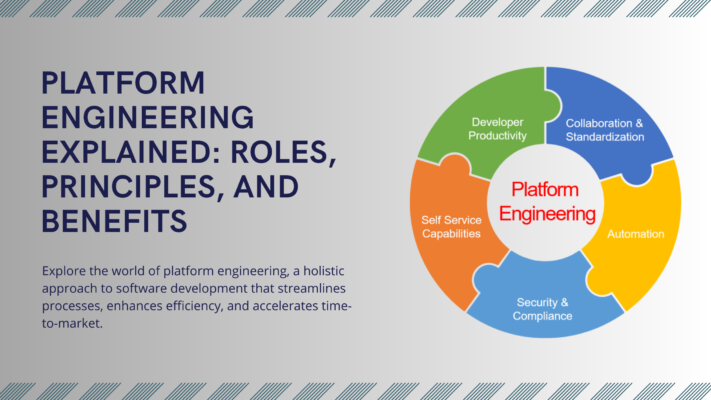
In the ever-evolving landscape of software development and delivery, enterprises are constantly seeking ways to streamline processes, enhance efficiency, and accelerate time-to-market. Enter platform engineering, a revolutionary approach that has gained significant traction in recent years. Platform engineering is a holistic methodology that aims to create a robust, scalable, and self-service platform for developers, enabling them to focus on delivering high-quality software products while minimizing operational overhead.
What is Platform Engineering?
Platform engineering is a discipline that involves designing, building, and maintaining an integrated set of tools, services, and processes that enable developers to efficiently build, deploy, and operate applications. It encompasses various aspects, including infrastructure automation, continuous integration and delivery (CI/CD) pipelines, developer self-service portals, and an array of shared services and capabilities.
At its core, platform engineering seeks to abstract away the complexities of infrastructure and operational tasks, empowering developers to concentrate on writing code and delivering value to end-users. By providing a standardized and streamlined development environment, platform engineering fosters collaboration, consistency, and scalability across teams and projects.
Why is Platform Engineering Important?
In today’s fast-paced digital landscape, where businesses demand rapid innovation and agility, platform engineering has become a critical enabler for enterprises to stay competitive. Here are some key reasons why platform engineering is crucial:
1. Accelerated Software Delivery: By automating and standardizing processes, platform engineering enables faster and more reliable software delivery cycles. Developers can focus on writing code rather than being bogged down by infrastructure and operational tasks, leading to increased productivity and shorter time-to-market.
2. Improved Developer Experience: Platform engineering aims to create a seamless and consistent developer experience by providing self-service capabilities, shared tools, and centralized resources. This empowers developers to work more efficiently, reduces context-switching, and encourages innovation.
3. Scalability and Consistency: With a centralized platform, enterprises can ensure consistency across teams, projects, and environments. This scalability enables organizations to adapt to changing business needs while maintaining a consistent and reliable application delivery pipeline.
4. Increased Reliability and Security: Platform engineering promotes the adoption of best practices, standardized configurations, and automated testing, leading to more reliable and secure applications. This approach reduces the risk of human error and ensures compliance with industry standards and regulatory requirements.
5. Cost Optimization: By leveraging automation and shared services, platform engineering can help enterprises optimize infrastructure costs and reduce redundant efforts across teams, resulting in significant cost savings and improved resource utilization.
What are the benefits of Platform Engineering for enterprises?
Adopting a platform engineering approach can yield numerous benefits for enterprises, enabling them to achieve greater agility, efficiency, and scalability in their software delivery processes:
1. Faster Time-to-Market: Platform engineering streamlines the software development lifecycle by automating repetitive tasks, enabling continuous integration and delivery, and providing self-service capabilities to developers. This accelerates the time-to-market for new features and applications, giving enterprises a competitive advantage.
2. Improved Developer Productivity: By abstracting away complexities and providing a standardized development environment, platform engineering empowers developers to focus on writing high-quality code. This increased productivity translates into more efficient resource utilization and faster delivery cycles.
3. Consistent and Reliable Deployments: Platform engineering promotes the adoption of best practices, standardized configurations, and automated testing, ensuring consistent and reliable deployments across different environments (e.g., development, staging, production).
4. Enhanced Collaboration and Knowledge Sharing: Platform engineering fosters a culture of collaboration and knowledge sharing by providing a centralized platform for development teams. This promotes cross-team communication, code reuse, and the sharing of best practices, ultimately leading to a more cohesive and efficient development process.
5. Improved Scalability and Flexibility: Platform engineering enables enterprises to scale their development efforts more effectively by providing a modular and extensible platform. This flexibility allows organizations to adapt to changing business requirements and technological advancements without disrupting existing workflows.
6. Reduced Technical Debt: Platform engineering encourages the adoption of modern architectural patterns, such as microservices and containerization, which promote modularity and maintainability. This approach helps reduce technical debt and ensures that applications remain adaptable and resilient over time.
7. Better Compliance and Security: Platform engineering facilitates the implementation of industry-standard security practices, regulatory compliance, and governance policies across the entire software delivery lifecycle. This helps enterprises mitigate risks and ensure adherence to relevant regulations and security protocols.
Why is platform engineering a significant trend?
Platform engineering has emerged as a significant trend in the software development landscape due to several driving factors:
1. Increasing Complexity of Software Systems: As applications become more distributed, cloud-native, and microservices-based, managing the underlying infrastructure and orchestrating deployments have become increasingly complex. Platform engineering provides a unified approach to handle this complexity, enabling teams to focus on delivering value rather than operational overhead.
2. DevOps and Cloud-Native Adoption: The widespread adoption of DevOps practices and cloud-native technologies, such as containerization and microservices, has necessitated the need for robust and scalable platforms to support these modern architectures. Platform engineering provides the foundation for seamless integration and automation of these technologies.
3. Demand for Faster Innovation: In today’s competitive business environment, enterprises need to rapidly innovate and adapt to changing market conditions. Platform engineering enables organizations to accelerate software delivery cycles, fostering agility and responsiveness to customer demands.
4. Focus on Developer Experience: As organizations recognize the value of attracting and retaining top talent, improving the developer experience has become a priority. Platform engineering offers a streamlined and productive environment for developers, enhancing job satisfaction and fostering innovation.
5. Scalability and Cost Optimization: With the growing demand for scalable and cost-effective solutions, platform engineering provides a centralized approach to managing infrastructure, automating processes, and optimizing resource utilization, ultimately leading to reduced operational costs and improved scalability.
Keys to platform engineering success
While the benefits of platform engineering are substantial, achieving success with this approach requires careful consideration and adherence to certain principles and best practices. Here are some keys to successful platform engineering implementation:
1. Collaborative Culture: Foster a collaborative culture that encourages cross-team communication, knowledge sharing, and the adoption of best practices. Platform engineering thrives when teams work together towards a common goal.
2. Modular and Extensible Design: Design the platform with modularity and extensibility in mind, allowing for easy integration of new technologies, tools, and services as needed. This ensures the platform remains adaptable to changing requirements.
3. Continuous Improvement and Feedback Loops: Implement mechanisms for continuous improvement, such as regular retrospectives, user feedback, and iterative development cycles. This helps identify areas for optimization and ensures the platform remains aligned with evolving business needs.
4. Automation and Self-Service: Prioritize automation and self-service capabilities to streamline processes, reduce manual interventions, and empower developers with the tools they need for efficient software delivery.
5. Governance and Standards: Establish clear governance policies, standards, and best practices to ensure consistency, compliance, and maintainability across the platform and its components.
6. Talent Development and Upskilling: Invest in talent development and upskilling initiatives to ensure teams have the necessary skills and knowledge to effectively leverage the platform and contribute to its ongoing evolution.
7. Metrics and Monitoring: Implement robust metrics and monitoring mechanisms to measure the platform’s performance, identify bottlenecks, and drive data-driven decision-making for continuous improvement.
Key Principles and Best Practices
To ensure the successful implementation and ongoing maintenance of a platform engineering approach, it’s essential to adhere to certain principles and best practices:
1. Automation: Embrace automation as a core principle, automating as many processes as possible, including infrastructure provisioning, testing, deployments, and monitoring. This reduces manual effort, minimizes errors, and ensures consistency across teams and environments.
2. Self-Service: Empower developers by providing self-service capabilities that enable them to provision resources, manage deployments, and access shared services without relying on central operations teams. This fosters autonomy, agility, and streamlined workflows.
3. Modularity and Reusability: Design the platform with modularity in mind, promoting the creation of reusable components, libraries, and services that can be shared across teams and projects. This approach reduces duplication of effort and fosters consistency throughout the organization.
4. Separation of Concerns: Clearly separate responsibilities and concerns within the platform, such as infrastructure management, application deployment, and shared services. This promotes maintainability, scalability, and the ability to evolve different components independently.
5. Standardization: Establish and enforce standards for coding practices, deployment processes, testing frameworks, and tooling. Standardization ensures consistency, reduces technical debt, and facilitates collaboration and knowledge sharing across teams.
6. Continuous Integration and Delivery (CI/CD): Implement robust CI/CD pipelines that enable automated build, testing, and deployment processes. This accelerates software delivery cycles, improves quality, and ensures a consistent and reliable release process.
7. Observability and Monitoring: Implement comprehensive observability and monitoring mechanisms to gain insights into the platform’s performance, health, and usage patterns. This data-driven approach enables proactive problem identification, capacity planning, and informed decision-making.
8. Security and Compliance: Embed security and compliance practices throughout the platform, including secure coding practices, vulnerability scanning, access controls, and audit trails. This ensures that applications and infrastructure adhere to relevant security standards and regulatory requirements.
9. Documentation and Knowledge Sharing: Foster a culture of documentation and knowledge sharing by maintaining up-to-date documentation, creating training resources, and facilitating knowledge transfer across teams. This promotes platform adoption, reduces knowledge silos, and ensures continuity during personnel changes.
10. Continuous Improvement: Continuously seek opportunities for improvement by collecting feedback from stakeholders, conducting retrospectives, and analyzing platform metrics. Implement a culture of iterative development and embrace change as a means to enhance the platform’s capabilities and align with evolving business needs.
Platform engineering vs. DevOps
While platform engineering and DevOps share some similarities, they are distinct concepts with different scopes and focus areas:
1. DevOps: DevOps is a culture, mindset, and set of practices that aim to bridge the gap between development and operations teams. It emphasizes collaboration, automation, and the integration of software development and delivery processes. DevOps primarily focuses on the processes, tools, and cultural aspects of software delivery.
2. Platform Engineering: Platform engineering, on the other hand, is a discipline that involves designing, building, and maintaining a centralized platform that enables developers to efficiently build, deploy, and operate applications. It encompasses infrastructure automation, CI/CD pipelines, developer self-service portals, and shared services, among other components.
While DevOps provides the cultural foundation and practices for seamless collaboration between development and operations teams, platform engineering provides the underlying infrastructure, tools, and services that enable efficient software delivery at scale.
In essence, platform engineering can be seen as an implementation of DevOps principles and practices, providing a concrete platform and set of capabilities to enable the seamless integration of development and operations activities. Platform engineering leverages DevOps practices and tools to create a standardized, automated, and self-service environment for developers.
Some Successful Examples
Several organizations have successfully implemented platform engineering approaches, resulting in improved software delivery processes, enhanced developer productivity, and increased business agility. Here are a few examples:
1. Netflix: Netflix’s iconic transition from a traditional DVD rental service to a global streaming platform was enabled by their successful adoption of platform engineering practices. They built a robust platform that leverages cloud-native technologies, microservices, and automation, enabling rapid software delivery and scalability to meet the demands of millions of concurrent users.
2. Spotify: Spotify’s platform engineering team has created a powerful internal platform called “Backstage” that provides a centralized hub for managing software projects, enabling developers to focus on building and shipping features. Backstage offers a comprehensive set of tools and services, including software catalogs, deployment pipelines, and monitoring capabilities.
3. Uber: Uber’s platform engineering team has developed a suite of tools and services called “Fusion.ai” that streamlines the development and deployment of machine learning models at scale. This platform provides a unified interface for data scientists, enabling them to build, train, and deploy models efficiently, while abstracting away the underlying infrastructure complexities.
4. Google: Google’s long-standing commitment to platform engineering is evident in their internal platforms like “Borg” and “Kubernetes.” These platforms enable Google’s engineers to build, deploy, and manage applications and services at massive scale, leveraging advanced scheduling, resource management, and automation capabilities.
5. Amazon: Amazon’s platform engineering efforts have resulted in the creation of industry-leading services like AWS Lambda, AWS CodePipeline, and AWS CodeBuild. These services empower developers worldwide to build and deploy applications efficiently, leveraging serverless architectures, continuous integration and delivery pipelines, and scalable infrastructure.
These examples illustrate the transformative power of platform engineering and how it can enable organizations to achieve unprecedented levels of agility, scalability, and efficiency in their software delivery processes.
Conclusion: How Upcore Technologies Enabling Platform Engineering in the Enterprise
At Upcore Technologies, we understand the critical role platform engineering plays in enabling enterprises to achieve their digital transformation goals. As a leading provider of cutting-edge product development and consulting services, we have helped numerous organizations across various industries to design, build, and implement robust platform engineering solutions.
Our team of experienced engineers and architects bring deep expertise in modern technologies, cloud-native architectures, and DevOps practices, enabling us to craft tailored platform engineering solutions that align with our clients’ unique business requirements and technical landscapes.
We follow a comprehensive approach that encompasses strategic planning, platform design, implementation, and ongoing support and optimization. Our platform engineering services include:
1. Platform Assessment and Strategy: We work closely with our clients to assess their current software delivery processes, identify bottlenecks, and define a clear platform engineering strategy aligned with their business objectives and technical roadmap.
2. Platform Design and Architecture: Our architects design modular, scalable, and extensible platform architectures that leverage best practices, industry standards, and cutting-edge technologies such as containerization, microservices, and serverless computing.
3. Platform Implementation and Integration: Our skilled engineers implement the designed platform, integrating various components such as CI/CD pipelines, infrastructure automation tools, developer self-service portals, and shared services. We ensure seamless integration with existing systems and processes.
4. Automation and Tooling: We specialize in automating processes, from infrastructure provisioning and application deployments to monitoring and incident response, leveraging industry-leading tools and frameworks.
5. Developer Enablement and Training: We provide comprehensive training and enablement programs to ensure seamless adoption of the platform engineering solution, fostering a culture of collaboration, knowledge sharing, and continuous improvement.
6. Continuous Optimization and Support: Our engagement extends beyond the initial implementation, as we continuously monitor, optimize, and evolve the platform to align with emerging technologies, evolving business needs, and industry best practices.
By partnering with Upcore Technologies, enterprises can unlock the true potential of platform engineering, accelerating their software delivery cycles, enhancing developer productivity, and driving innovation at scale. Our client-centric approach, technical expertise, and commitment to excellence make us the ideal partner for organizations seeking to embark on their platform engineering journey.
If you’re interested in learning more about how Upcore Technologies can enable platform engineering in your enterprise, please reach out to our team of experts. We’re excited to discuss your unique requirements and explore how we can help you achieve your digital transformation goals through the power of platform engineering.


